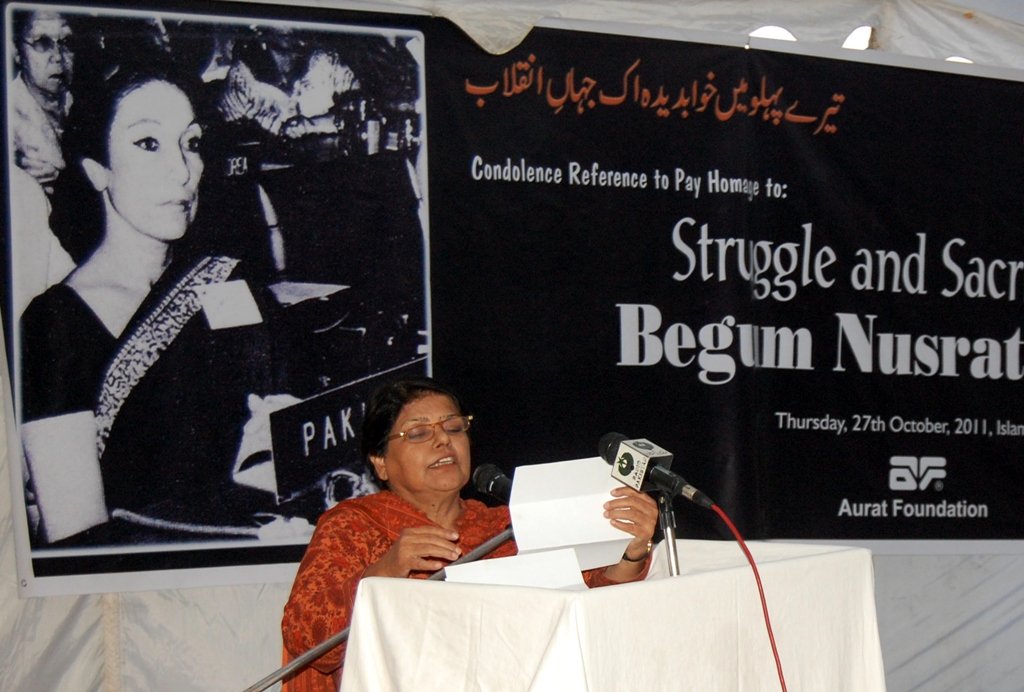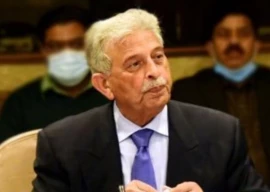
She carved for us a woman of a new age. And we thought such a woman would not possibly walk the earth. But it did. And the one walking was none other than the creator herself. She epitomized what she had dared to pen in her poetry.
The world knows her by the name of Kishwar Naheed.
This is a gist of the talk delivered by the acclaimed writer Intizar Hussain at “an evening with Kishwar Naheed organised by the Sustainable Development Policy Institute (SDPI) under its “Tribute to Living Legend” series.
Naheed presented a woman who is not separated from the lover, oppressed but defiant, and not sorrowful, according to Hussain. Her poetry, which addresses issues of women rights and militancy, has paved the way for more women writers who are producing wonderful poetry.

Kishwar in her 74th year of life is as much the rebel and activist now as she was at the start of her formal literary career some four decades ago when she first began to challenge the male-dominated Pakistani literary scene and an equally patriarchal Urdu poetic structure through her gender-sensitive and feminist diction.
It was no surprise then that her peers, friends, relatives and a veteran writer could not stop praising the non-conformist poet at the evening dedicated to celebrating her life, works and struggle for human rights.
“Her status among women Urdu poets is like the first drop of rain,” said Hussain, who chaired the ceremony, after he had explained the nearly complete lack of women poets and gender perspectives in classical Urdu poetry.
The mild-mannered Hussain tried to apologize for men, from the post-classical era, whose seemingly sympathetic Urdu poetry for women Kishwar disagreed with. But he admitted, jokingly or otherwise, that the present era is the “age of women.”

“Either that or it is the age of mullahs,” Hussain quipped. “Most of us moderates in Pakistan are stuck in between, but if given the choice we have to choose the side of our women poets.”
He said Kishwar’s poetry was groundbreaking in the sense that it challenged the typical concept of woman-as-the-beloved in classical poetry and the idea of a sad woman, or birhan, longing for her lover while suffering the pain of separation in most texts.
“Poetry is the surety of my life,” Kishwar Naheed said, on her turn to speak. “I once said somewhere that I write poetry because I do not commit suicide.”
But before reciting her poems, she in her characteristic courageous tone, pointed out her displeasure of the ongoing peace talks between the government and Taliban.
“It is a disgrace that a big country such as Pakistan is trying to have talks with a small group,” she said. “We are always looking for life and they search death for us.”
She recited poems that were diverse in expression yet thematically connected.
From the poignant “Bajaur ka Taziyatnama” to the ever-stirring anthem of defiance “Hum gunahgaar auratein,” Kishwar’s poems elicited genuine applause from a conference room packed full of Islamabad-based writers, poets, fans and activists, most of who were familiar with her works but appeared to be mesmerized anew.
Speakers Ashfaq Saleem Mirza, Ayesha Siddiqa, Naeem Ahmed Mirza and Shamim Ikramul Haq spoke about different aspects of Kishwar’s life and works. Among the four of them, they praised her principled and defiant struggle for women’s rights through words and action.
Their speeches and essays portrayed her as a unique, firebrand resistance poet in her professional life and a kind, hospitable friend and mother-figure in her personal life.
During the ceremony, activist Tahira Abdullah read poems written by Kishwar Naheed whereas, Rebeka Naomi Wigemark, wife of the European Union Ambassador and Hassan Abbas Rizvi read poems for Naheed.
Published in The Express Tribune, February 15th, 2014.
COMMENTS (1)
Comments are moderated and generally will be posted if they are on-topic and not abusive.
For more information, please see our Comments FAQ

































1714024018-0/ModiLara-(1)1714024018-0-270x192.webp)









She should be running the affairs of our existence like she runs the affairs of her poetry ! I wish !